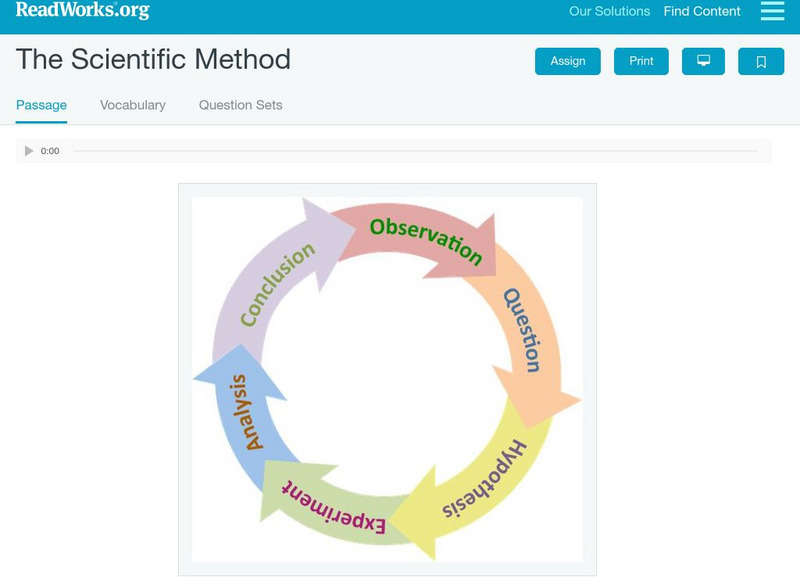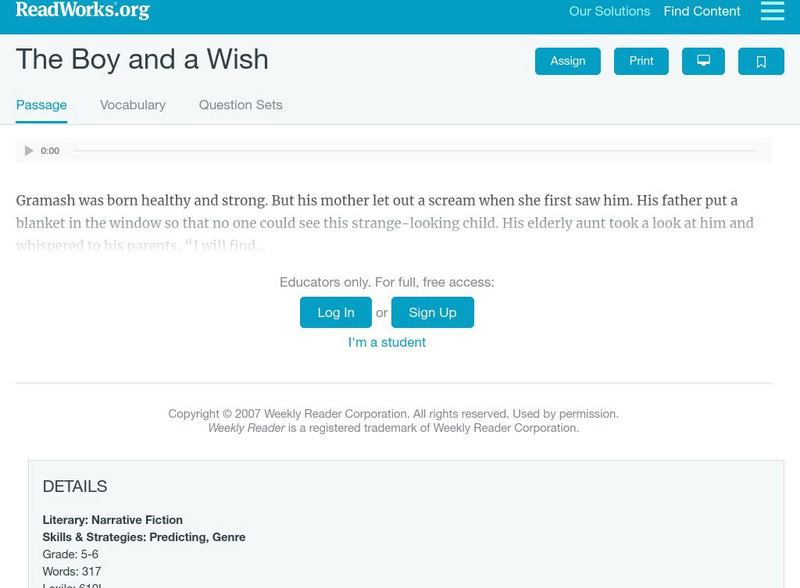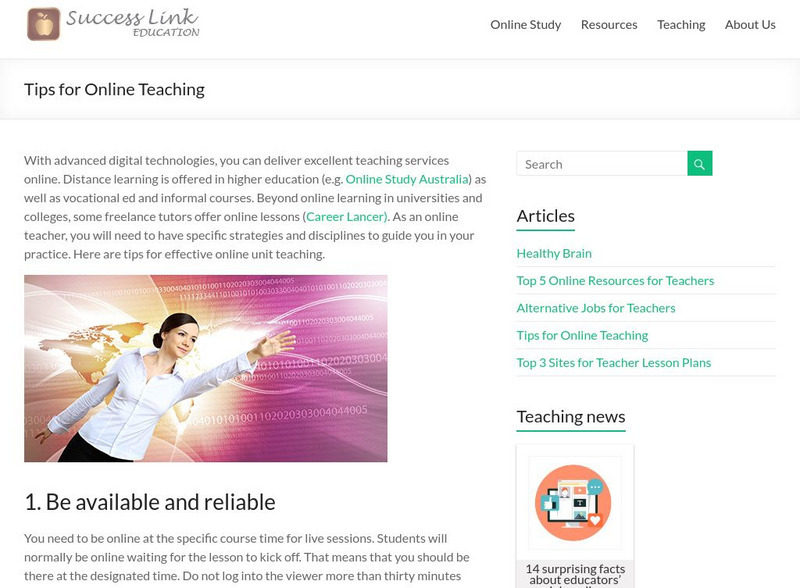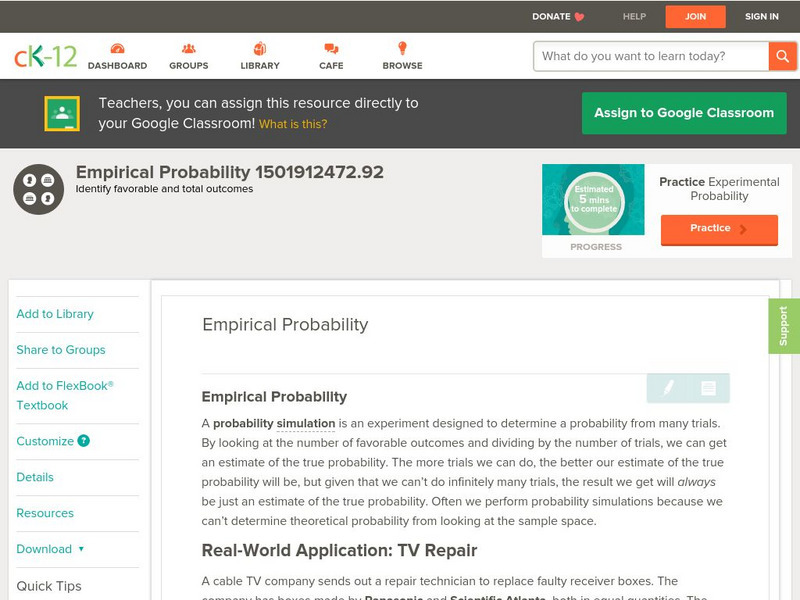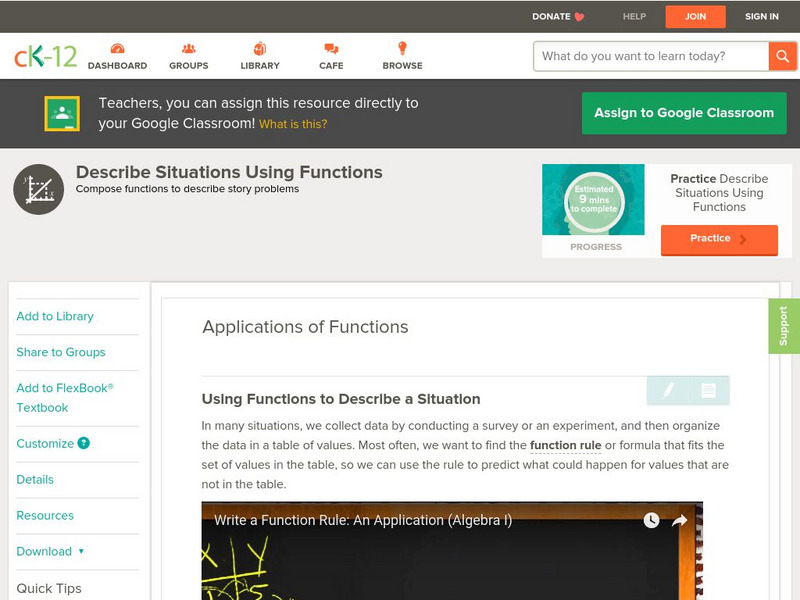Science Education Resource Center at Carleton College
Serc: Cube Puzzle and Toilet Paper Roll Model in Teaching the Nature of Science
This lesson incorporates inexpensive materials such as carton boxes, toilet paper roll tube, strings and toothpicks. It engages learners to conduct pattern observation, prediction, testing and ends up with a model construction. It also...
CK-12 Foundation
Ck 12: Earth Science : Scientific Explanations and Interpretations
[Free Registration/Login may be required to access all resource tools.] Presents the relationships of facts, explanations, and opinions in science.
CK-12 Foundation
Ck 12: Algebra: Function Rules Based on Graphs
[Free Registration/Login may be required to access all resource tools.] Students learn to write a function rule and draw conclusions from the graph of a function. Students examine guided notes, review guided practice, watch instructional...
Read Works
Read Works: The Scientific Method
[Free Registration/Login Required] This nonfiction passage lists steps in the scientific method. This passage reinforces essential reading comprehension skills. Opportunities for vocabulary acquisition are also included. Several...
Read Works
Read Works: The Boy and a Wish
[Free Registration/Login Required] A literary text about a boy who was born with a physical deformity and was then turned invisible. A question sheet is available to help students build skills in reading comprehension.
CK-12 Foundation
Ck 12: Biology: Scientific Investigation
[Free Registration/Login may be required to access all resource tools.] How scientists study the natural world.
American Geosciences Institute
American Geosciences Institute: Weather Forecasting Over 200 Years
Read a brief synopsis of how weather forecasting has changed over the past 200 years.
Read Works
Read Works: Genre 4th Grade Unit: Strategies for Identifying Genres
[Free Registration/Login Required] A lesson plan in which students use books from the classroom library to learn strategies that can be utilized to determine the genre of a book and to understand how knowing the genre before reading can...
PBS
Nova Online: How Many Pearls? A Weight & Volume Game
This interactive game has students apply skills in estimation, measurement, and basic addition using pearls. Students are asked to estimate the number of pearls in a treasure chest by making predictions and using number sense. The skills...
Other
Fagler College/nas 111/scientific Methodology
Power Point presentation on scientific method for NAS 102 Human and Environmental Biology II.
McREL International
Mc Rel: Glue Polymer (Whelmer #15 Learning Activity)
An easy to do activity that investigates the basic principles behind chemical bonding. The activity is written in lesson plan format that meets NSES standards.
Scholastic
Scholastic: Study Jams! Science: Scientific Inquiry: Outcomes and Predictions
A video and a short multiple-choice quiz on identifying possible outcomes and making predictions.
Sophia Learning
Sophia: Making Predictions
Notes on using the reading strategy of making predictions before and during reading to increase comprehension. Notes can be both read and listened to.
CK-12 Foundation
Ck 12: Earth Science: Science Fact or Opinion?
[Free Registration/Login may be required to access all resource tools.] Presents the relationships of facts, explanations, and opinions in science.
PBS
Pbs Learning Media: Blue Ribbon Readers: The Detective's Notebook Game
An online learning game where students read the notes in a detective's notebook and make inferences and predictions to solve the case.
Illustrative Mathematics
Illustrative Mathematics: Longer and Heavier? Shorter and Heavier?
Students will compare the length and weight of several pairs of objects to learn that weight and length are separate measurable attributes, and not always related.
Success Link
Success Link: Fruit Loops Graphs
A lesson plan on graphing for young students that can be adapted for older elementary students too. Use Fruit Loops for providing data that can be expressed in many different graphs.
TED Talks
Ted: Ted Ed: Why Are Earthquakes So Hard to Predict?
Why are earthquakes so hard to anticipate, and how could we get better at predicting them? Jean-Baptiste P. Koehl investigates.
Other
Csicop: Field Guide to Critical Thinking
This article, originally published in Skeptical Inquirer, outlines some of the key components of the scientific problem-solving process while addressing the many reasons for the popularity of paranormal beliefs in the U.S. (Published in...
CK-12 Foundation
Ck 12: Probability: Empirical Probability
[Free Registration/Login may be required to access all resource tools.] Simulate real-life situations with an experiment and find the experimental probability of a specific event.
CK-12 Foundation
Ck 12: Algebra: Using Functions to Describe a Situation
[Free Registration/Login may be required to access all resource tools.] Students learn to write a function rule from a table of values and represent real-world situations with a function. Students examine guided notes, review guided...
Alabama Learning Exchange
Alex: What Is the Pulgar?
This is a lesson for young scholars in grades 4-6 to learn visualization, prediction, and sequencing.
Alabama Learning Exchange
Alex: Chemistry Is Colorful!!
For this lesson ,students are introduced to the five major types of chemical reactions reaction type will be analyzed and examples will be noted. Students will then perform a lab investigation which includes each of the different...
Alabama Learning Exchange
Alex: Literary Elements in Jan Brett's the Mitten
Students will analyze such literary elements as plot, cause-effect relationships, sequence, and prediction in Jan Brett's The Mitten. Students will enjoy predicting upcoming story events and retelling the story from a dialogue that shows...





